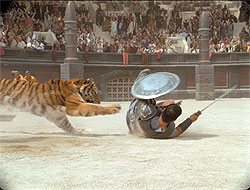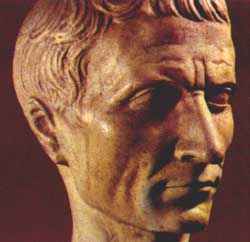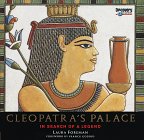Civil wars
 When Caesar was in Gaul and organized the conquered territories, Pompey and Crassus tried to enlarge their power too. Pompey was successful: in 52, he was elected "consul without colleague", and he yielded dictatorial authority. Crassus, however, was unfortunate: after his consulship, he became governor of Syria with special prerogatives, and was defeated by the Parthians, who lived in modern Iraq. They murdered the Roman general by giving him what he had desired most, gold: the precious metal was liquified and poured into his mouth.
When Caesar was in Gaul and organized the conquered territories, Pompey and Crassus tried to enlarge their power too. Pompey was successful: in 52, he was elected "consul without colleague", and he yielded dictatorial authority. Crassus, however, was unfortunate: after his consulship, he became governor of Syria with special prerogatives, and was defeated by the Parthians, who lived in modern Iraq. They murdered the Roman general by giving him what he had desired most, gold: the precious metal was liquified and poured into his mouth.
After Crassus's death, Pompey and Caesar remained, and the Senate feared a civil war, from which a king would arise. An overwhelming majority in the Senate (400 against 22) wished both dynasts to lay down their extraordinary commands before the consular elections in December 50. (The question if this was lawful remains unanswered: in 52, the People's Assembly had allowed Caesar to run for consul without being present.) After some deliberations, Pompey obeyed the Senate.
He was in a better position than Caesar. If the latter obeyed, he was no longer immune to prosecution. Cato had charged him with war crimes in Germany, and many people remembered Caesar's first consulship and the Spanish War. If Caesar refused to obey, he would be declared an enemy of the state: the Senate would be forced to appoint a commander with plenary powers, and it was not hard to see who this general would be.
In 49, on January 7, the Senate demanded Caesar to hand over his ten well-trained legions to a new governor. Caesar heard the news in Ravenna, and knew that he had to make a choice between prosecution and rebellion: preferring the dignity of war over the humiliation of a process, Caesar chose to rebel, quoting his favourite poet Menander, "the die is cast". On January 10, his army advanced to Rimini, where Caesar could control the passes across the Apennines: in doing so, he crossed the river Rubico, thereby invading Italy and provoking the Second Civil War. Caesar's perspectives did not look great: nine of his legions were in Gaul.
As it turned out, the Senate had made a disastrous mistake. It had believed that the issue was between a rebel and the legitimate rulers, and had expected that the towns of Italy would send troops in defence of the authority of the Senate and the Roman People's liberties. But Italy was sceptical about its champions, and showed no enthusiasm to defend the constitution. For Caesar's soldiers, on the other hand, everything depended on this one campaign: if they failed, they would never receive their pension. Unable to raise armies, the Senate was helpless. Two weeks after the start of the Civil War, Caesar was master of Italy and had hunted his enemies to the heel of Italy, from where Pompey and many senators fled to Greece.
Caesar did not waste his time. The situation was clear: the Senate had seven legions in Spain without commander, Pompey was in Greece without army. Caesar decided to attack the army first. When he entered Rome, Caesar pardoned instead of massacred his enemies and created a new Senate, which would authorize Caesar's acts. Before it had assembled, Caesar was already on his way to Spain, in the meanwhile proposing a law to give Roman citizenship to the inhabitants of Cisalpine Gaul. After picking up his legions in the neighbourhood of Marseilles, Caesar crossed the Rhone and the Pyrenees, and defeated the Spanish army in the Battle of Ilerda, close to modern Barcelona. Again, Caesar showed clemency, sparing the commanders and disbanding the defeated legions. He rushed to Corduba, where two legions (commanded by Varro) submitted to Caesar. After his return, Caesar was made dictator: he had been out of Rome for three months.
Meanwhile, Pompey was in Greece, and by drawing upon the resources of the eastern provinces and client kings, he managed to raise an army of eight legions and a fleet of 300 ships, commanded by Bibulus. Now he was able to return to Italy. This was precisely what Caesar feared, and in despite the risk of winter navigation, he got seven legions across the Adriatic. Pompey was not surprised and blocked Caesar in Dyrrhachium (modern Drres). Caesar was in an awkward position, but in March 48 at last Marc Antony managed to reinforce Caesar with four legions. The united army managed to break through Pompey's lines, crossed the Pindos-mountains and defeated the pursuing Roman army near Pharsalus (August 9). Almost 6,000 soldiers were killed, and when Caesar surveyed the battle field and saw the bodies of the dead senators, he said: "Well, they would have it thus."
Pompey survived the Battle of Pharsalus, and went to Egypt, followed by Caesar. When Caesar arrived, he learned that Pompey had been executed by soldiers of the ten year old king Ptolemy XIII, who hoped to gain Caesar's support in his quarrel with his older sister Cleopatra VII. It turned out differently: Caesar was furious that he was not given the chance to pardon Pompey. When Caesar met Cleopatra, he was captivated by the girl's charms and chose her side in the Alexandrine War: Caesar's soldiers arrived in the spring of 47 and defeated Ptolemy. The boy's body was found in the Nile.
Having pacified Egypt, Caesar and Cleopatra spent two months on a honeymoon cruise on the Nile. Then Caesar hurried off to Asia Minor, where Pharnaces, the son of Mithridates, had challenged Roman authority. He was defeated in a rapid campaign at Zela ("I came, I saw, I conquered"). Having defeated Pompey and having calmed Egypt and Asia, in the course of the summer (47) the dictator was free to return to Rome.


|










